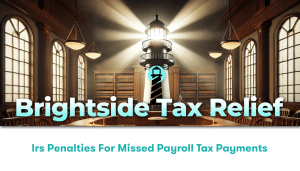A Comprehensive View of FIRPTA Withholding
Referred to as the Foreign Investment in Real Property Tax Act of 1980, FIRPTA Withholding is an essential subject for both domestic and overseas investors. If a non-U.S. resident sells U.S. property, the IRS mandates a specific withholding tax — or FIRPTA, to ensure taxes owed on the gains of such sales are collected. Brightside Tax Relief LLC, a nation-wide tax relief company, is here to offer clarity on this subject.
With a solid record in tax relief consultation and deep knowledge of the tax code, Brightside Tax Relief LLC’s aim is to demystify FIRPTA Withholding for you. We hope to provide useful insights and practical tips to navigate this often complex terrain.
Understanding What FIRPTA Withholding Is
Attempting to withhold and remit taxes from foreign etities who may have no other U.S. business activities, FIRPTA is a unique aspect of the US tax system. The main goal of FIRPTA is to ensure foreign individuals/entities pay taxes on the income they generate from their U.S. investment properties. When such property is sold, a requisite amount is withheld – the FIRPTA withholding amount – and this amount amplifies the final tax liability on the disposal income.
The rate for FIRPTA withholding is generally 15% of the gross sales price. That means if a foreign person sells a U.S. property for $1,000,000, the FIRPTA withholding would be $150,000 – this amount to be held until the tax on the gain is finally determined.
Role of FIRPTA Withholding
An essential aspect of FIRPTA Withholding is that it applies to “foreigners,” or more specifically, non-resident aliens (NRAs), foreign corporations, foreign partnerships, foreign trusts or foreign estates. U.S. tax laws treat distributions from such investments as effectively connected income (ECI), subject to standard rates.
Therefore, FIRPTA withholding ensures that the IRS can collect the requisite tax revenues from these transactions. If, there is any overpayment, the seller can file for a refund from the IRS after the end of the tax year. On the other hand, if taxes have been underpaid, the seller will be required to make additional payments.
Exemptions to the FIRPTA Withholding
Whilst FIRPTA Withholding happens to be the general rule, there exist exceptions. For example, the disposition of certain types of property, including interests in domestically controlled REITs, is exempt from FIRPTA Withholding. Additionally, dispositions by foreign students, teachers, and trainees are also exempt under certain conditions.
Furthermore, if the property being sold is to be used as a residence and the amount realized (usually the sales price) is not more than $300,000, the buyer may be exempt from withholding tax. Here, it is essential that the buyer or a member of their family have definite plans to reside at the property for at least 50% of the number of days the home is used during each of the first two years.
The FIRPTA Withholding Process
As a buyer, if you purchase U.S. real property from a foreign seller, you are considered the transferee, and you may be held liable for the tax if you don’t withhold. As a result, knowledge of the FIRPTA withholding process becomes critical in a real estate transaction.
The duty in FIRPTA withholding falls on the buyer/transferee and not the foreign seller/transferor. Generally, the buyer must deduct and withhold the tax on the total amount realized by the foreigner on the disposition. The buyer then reports and remits the withheld tax to the IRS using Form 8288 (“U.S. Withholding Tax Return for Dispositions by Foreign Persons of U.S. Real Property Interests”) and Form 8288-A (“Statement of Withholding on Dispositions by Foreign Persons of U.S. Real Property Interests”).
Before closing on the property, the buyer must determine whether the seller is a foreign person and therefore subject to FIRPTA withholding. It is crucial that one who is involved in a real estate transaction seek approval from a financial advisor if it is suspected that the other party in the transaction is a foreign person.
Mechanics of FIRPTA Withholding
Undeniably, FIRPTA withholding has a high degree of complexity with potential risk of penalties if not handled correctly. To learn more about FIRPTA Withholding, continue your research with this excellent resource provided by the IRS.
Keep in mind, as taxation can be intricate, especially in an area as dynamic as FIRPTA withholding, it’s strongly recommended that you engage the expertise of experienced tax professionals. A company like Brightside Tax Relief LLC can guide you safely through the process, ensuring your complete compliance with complex tax regulations while also guarding you against any potential tax penalties.
Final Words
Every real estate transaction contains many moving parts and potential complications. This is especially true when one of the parties is a foreign individual or entity, as FIRPTA Withholding adds an additional layer of complexity. However, with a proper understanding of this IRS regulation, as provided in this article, and with expert guidance from a tax relief firm like Brightside Tax Relief LLC, you can ensure you’re always one step ahead.
Remember, FIRPTA doesn’t have to be intimidating. With the right knowledge at your disposal, you can make more confident decisions in your real estate transactions. Don’t navigate this complex topography alone — Contact Brightside Tax Relief LLC for professional advice regarding FIRPTA Withholding and many other tax-related affairs.




